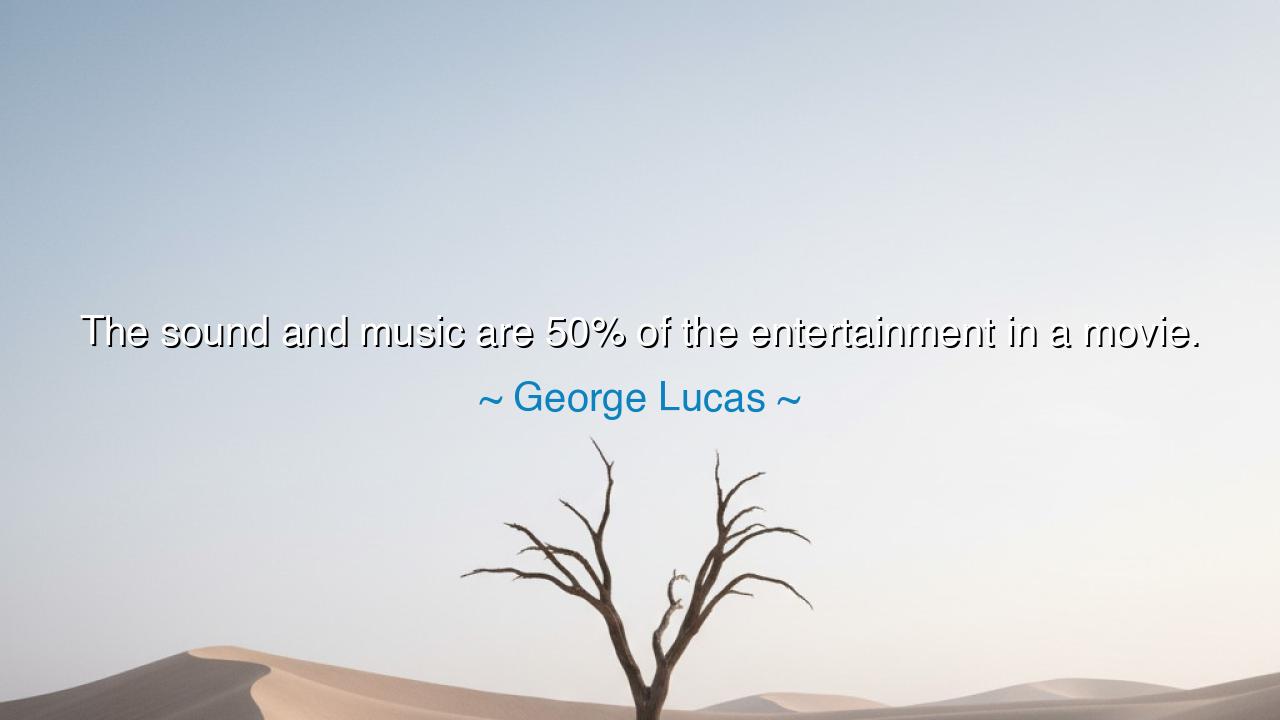
The sound and music are 50% of the entertainment in a movie.






“The sound and music are 50% of the entertainment in a movie.” So spoke George Lucas, the dreamer who gave the world Star Wars, and in this statement he unveiled a truth that many forget: that cinema is not only a matter of images but of voices, echoes, and melodies that stir the soul. The eye may see the spectacle, but it is the ear that awakens the heart. A battle without sound is but shadow-play; a love without music is but silence. Truly, half the magic of the screen lies not in what is shown, but in what is heard.
In the ancient days, before moving pictures, storytellers knew this well. The rhapsodes of Greece recited Homer’s epics with lyres in hand, weaving words and song into a tapestry that moved men to tears and roused them to war. The power of rhythm, of tone, of music, was always present as a companion to narrative. Lucas merely reminds us of an eternal law: that sound and music are not adornments, but pillars, equal in strength to sight itself.
Consider Star Wars. Without John Williams’ score, would the twin suns of Tatooine burn so brightly in memory? Would Darth Vader’s entrance command such awe without the thunder of the Imperial March? It is the marriage of sight and sound that births immortality. Lucas knew this, and thus he entrusted half his vision to the language of music. When people recall those films, they do not recall images alone—they hum the notes, they feel the vibrations, and they relive the story through sound. Here we see why he proclaimed that sound is half the experience: because it enters not through the eyes, but directly into the soul.
History gives us more examples. In the days of silent film, theaters employed live musicians to accompany the images. Audiences laughed louder at comedies and wept more deeply at tragedies when the piano or orchestra spoke alongside the actors. When sound was finally joined to film, it did not merely add dialogue—it completed the art. The Jazz Singer of 1927 is remembered not for its visuals, but for the moment when sound broke free, a man sang, and cinema was transformed forever. The world understood then what Lucas later declared: without sound, cinema is incomplete.
There is wisdom here beyond cinema. For in life itself, the music we carry and the words we speak are half the story. A gesture without tone may be misread, but when joined with voice, its meaning becomes clear. A memory without sound is a shadow, but a song can summon the past with unbearable clarity. Sound is the soul of memory, music the keeper of emotion. To neglect them is to silence half of life’s great theater.
Let us, then, draw the lesson. Whatever craft we pursue, do not focus only on what is seen—the surface, the form, the appearance. Attend also to what is heard: the words we choose, the rhythm of our speech, the harmony or discord we bring into the spaces we inhabit. Just as a film without music feels empty, so too does a life without mindful sound. Fill your days not only with sights but with songs, with voices that heal, with words that endure.
Practical wisdom follows. If you are a creator, honor sound as you honor sight. If you are a worker, attend to your tone as much as your deeds. And if you are a seeker, fill your heart with music that lifts you, for it will shape how you walk through the world. As cinema is half sound, so life itself is half the unseen resonance of voices, of harmonies, of silence broken at the right moment.
Thus remember the words of Lucas: “The sound and music are 50% of the entertainment in a movie.” Guard them well, honor them deeply, for they are not mere additions but equal partners in creation. Sight moves the eyes, but sound moves the soul—and when both walk together, the result is immortality.






AAdministratorAdministrator
Welcome, honored guests. Please leave a comment, we will respond soon